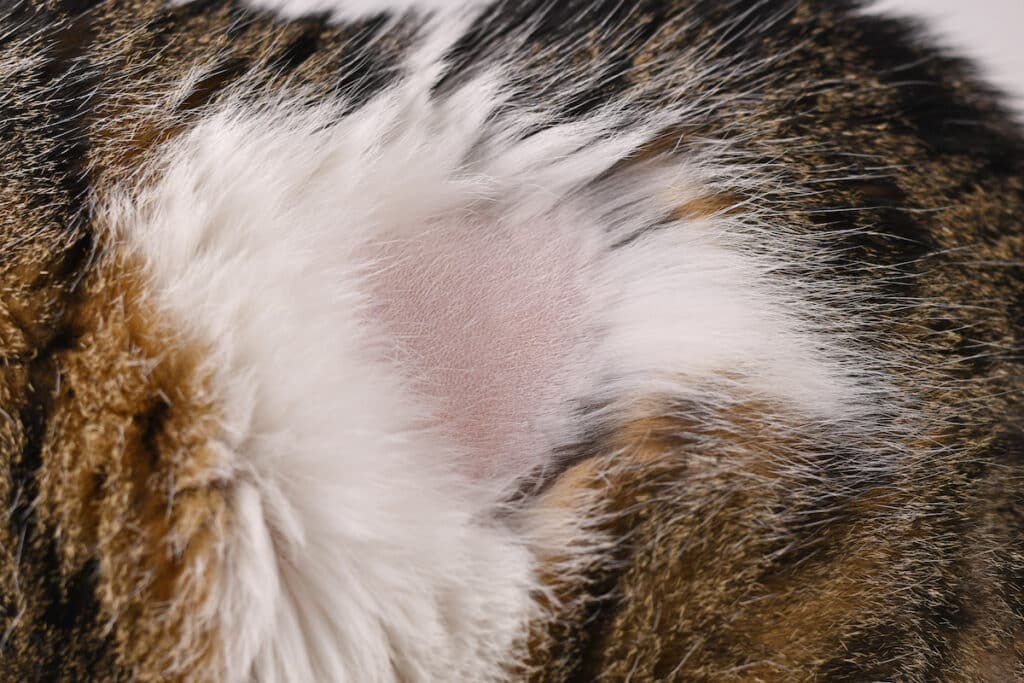Generally speaking, if you want to know whether your cat’s hair will grow back, there are a few factors that you should take into consideration. Those factors are the age of the cat, the breed of the cat, the health of the cat and the environment in which the cat lives. Besides, if the cat has suffered from a disease like dandruff, ringworm or ear mites, the hair may not grow back.
Contact dermatitis
Usually, contact dermatitis in cats is a result of allergic reaction or it is caused by irritant. If you want to protect your pet, it is advisable to keep them away from allergens and irritants. A visit to a vet may help you decide the best course of action. Medications to reduce itching and inflammation may also be prescribed.
Symptoms of follicular contact dermatitis include itching and oozing of the skin, as well as recurrent or persistent lesions. The lesions may be erythematous and acneiform, and may also present as follicular-based pustules.
Several studies have reported that follicular contact dermatitis can be caused by several agents. These include neomycin, a topical antibiotic, a chemical in colored permanent pressing sheets, and a vehicle containing an agent. These agents may act as irritants, allergens, or both. The main therapeutic intervention for follicular contact dermatitis is the withdrawal of the causative agent. Alternatively, a topical corticosteroid preparation may be used to reduce inflammation and promote resolution of the lesions.
Ear mites
Getting your cat checked out by a vet for ear mites is a good idea. They can diagnose the disease, and prescribe a proper treatment. If you think your cat has ear mites, you’ll need to treat the problem as quickly as possible to minimize pain and suffering.
The most obvious symptoms are itchiness and an ear full of debris. Ear mites are tiny insects that can cause serious discomfort. If they are not treated, they can cause damage to the skin and ear canal. They can also cause hair loss, which will make your cat look unattractive.
While they aren’t very visible to the naked eye, ear mites are actually quite contagious. Cats and other pets that share their kennel can contract ear mites from each other.
Ringworm
Having a ringworm infection in your cat can be a frustrating experience. The symptoms include redness, itching, and oozing boils. It can also cause patchy hair loss.
Ringworm is caused by a fungus that feeds on keratin. This fungus lives in hair follicles and is passed on from one animal to another. A cat can catch ringworm from contaminated objects or a person.
Cats infected with ringworm remain contagious for three weeks. It can be passed to other pets and people in the home. To prevent this, it’s best to treat your cat and decontaminate your home.
Once the ringworm has been diagnosed, your vet will prescribe an anti-fungal medicine. Some cats can’t tolerate the medicine and may experience side effects.
Stress
Whether your cat is suffering from a medical condition or a behavioral problem, you may be wondering why your cat is losing hair. Hair loss can be caused by a variety of factors including infection, hormonal imbalances, a poor diet, or even genetics. However, if your cat has lost a substantial amount of hair, you should consult your veterinarian.
Medical conditions such as hypothyroidism or hyperthyroidism can cause a cat to produce too much or too little thyroid hormone. This can cause hair to lose its shine, or even cause alopecia.
Symptoms include excessive licking, balding, dandruff, and hair loss. If your cat is losing hair around its eyes, ears, and tail, you may want to visit your vet to find out the cause.
Dandruff
Having cat dandruff can be very unpleasant. It can cause redness, itching, and scaly patches. In addition, it can lead to general hair loss.
If you think your cat may have dandruff, you should take it seriously. It’s important to have a vet examine it. They can diagnose the underlying problem and prescribe an effective treatment.
Dandruff is caused by a variety of factors, including internal imbalances and external parasites. It can be caused by allergies, infections, or fungal infections.
Cats need to be fed a diet that contains high-quality proteins, essential fatty acids, and vitamins to regulate cell growth and oils. These are important for overall skin health.
Telogen effluvium
Symptoms of telogen effluvium include a sudden increase in hair loss, itching or tenderness in the scalp, or altered sensations in the scalp. The hair loss is temporary and will usually subside within a few months. Usually, telogen effluvium is associated with a major stressful event.
The normal hair cycle involves the growth phase, involution phase, and telogen phase. The telogen phase lasts for about 100 days. During this time, the hair is ready to fall out. The follicles hold the hair in telogen until the new anagen hair begins growing. After about six months, the normal cycle resumes and the hair re-grows.














